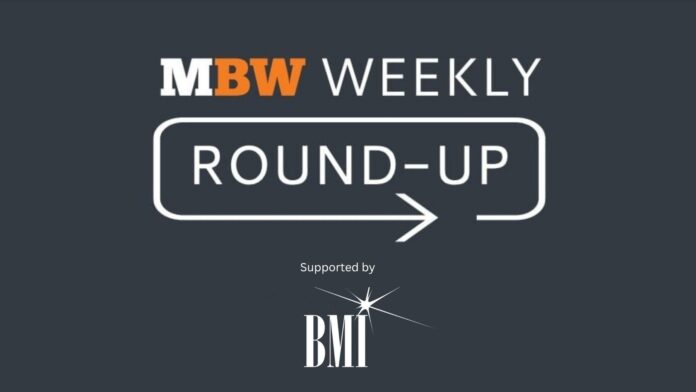This week, Sony Pictures’ animated film KPop Demon Hunters officially became Netflix‘s most-watched movie of all time, accumulating 236 million views since its June 20 release, surpassing Red Notice’s previous record of 230 million views.
Meanwhile, BMG CEO Thomas Coesfeld spoke exclusively to MBW to discuss the company’s H1 2025 results. BMG’s organic revenue dipped 4.4% YoY to EUR €424 million in the first half of the year, but the firm said underlying streaming revenue climbed by high single digits.
Elsewhere, MBW reported that AI music generator Suno filed a bold motion to dismiss a class action lawsuit from independent artists. The AI company is that none of the millions of tracks created on its platform contain anything resembling a “sample” from existing recordings.
Also this week, Spotify rolled out in-app direct messaging to make sharing music and content easier among friends and family, while a UK tribunal rejected Blur drummer Dave Rowntree’s class action lawsuit against PRS for Music over black box royalty distribution.
Here are some of the biggest headlines from the past few days…
1. KPOP DEMON HUNTERS JUST BECAME NETFLIX’S MOST-WATCHED MOVIE OF ALL TIME
Netflix’s animated film KPop Demon Hunters has officially become the streaming platform’s most popular movie ever, accumulating 236 million views since its June 20 release and adding another 25.4 million views in the week ending August 24.
Netflix’s previous record holder, Red Notice, accumulated 230 million views during its first 91 days on the platform after being released in 2021. KPop Demon Hunters has 24 days remaining before surpassing the same 91-day premiere window.
The film’s remarkable performance shows no signs of slowing, with the movie exhibiting nearly 0% audience decline for three consecutive weeks after two straight intervals of 26 million views each.
The Sony Pictures production is building on the unprecedented success of its music, with KPop Demon Hunters becoming the first soundtrack to claim four simultaneous Top 10 songs on the Billboard Hot 100… (MBW)
2. THOMAS COESFELD ON BMG’S H1 2025 RESULTS, WHY MUSIC STREAMING ‘REMAINS UNDERVALUED’, AND A STRATEGY FOCUSED ON THE ‘CORE BUSINESS’ OF MUSIC RIGHTS
BMG reported its H1 2025 results on Wednesday (August 28), with the Bertelsmann-owned company’s organic revenue dipping 4.4% YoY to EUR €424 million in the period, while underlying streaming revenue climbed by high single digits.
Meanwhile, BMG’s EBITDA margin jumped significantly to 28.7% – impacted by what Bertelsmann called a “strategic scaling back of lower-margin activities.”
For Thomas Coesfeld, BMG’s CEO since 2023, these results represent progress toward a more focused, efficient operation. Speaking exclusively to MBW, Coesfeld also addressed Spotify’s recent price increases, stating that “compared to audiovisual, music has historically been slower to adjust pricing and remains undervalued relative to the value it delivers”… (MBW)
3. SUNO ARGUES NONE OF THE MILLIONS OF TRACKS MADE ON ITS PLATFORM ‘CONTAIN ANYTHING LIKE A SAMPLE’
AI music generator Suno is fighting back against copyright infringement claims from independent artists with a bold legal argument that could reshape the AI music debate.
In a motion to dismiss filed in federal court on August 18, Suno argued that the indie artist lawsuit “fails as a matter of law” and should be dismissed. The company claims that music made on Suno doesn’t actually “sample” existing recordings – regardless of what music was used to train its AI model.
This represents a potentially game-changing legal strategy: Suno claims that even if its AI learned from copyrighted songs, the outputs it generates are entirely new sounds that cannot infringe existing recordings under US copyright law… (MBW)
4. SLIDE INTO SPOTIFY’S DMS: PLATFORM LAUNCHES IN-APP MESSAGING TO BOOST CONTENT SHARING
Spotify has started rolling out a direct message feature inside its app, which the platform says is meant to make sharing music and other content easier. The new feature, announced on Tuesday (August 26), will be available on mobile devices “in select markets” to both Free and Premium users, but only to those aged 16 and over.
To use the new DM feature, Spotify users can tap the share icon while listening to content in the ‘Now Playing’ view, which will bring up a list of people the user has interacted with before through Spotify.
Spotify’s DMs support text and emojis, but the company is quick to point out it’s not aiming to replace other social media platforms. DM chats are not fully end-to-end encrypted, but Spotify says they are protected with “encryption in transit and at rest….” (MBW)
5. UK TRIBUNAL REJECTS BLUR DRUMMER’S CLASS ACTION LAWSUIT AGAINST PRS FOR MUSIC OVER ‘BLACK BOX’ ROYALTIES
A UK judicial tribunal has rejected a proposed class action lawsuit against performance rights organization PRS for Music over how it distributes “black box” royalties – royalties owed on songs whose rightsholders haven’t been properly identified.
In a judgment issued on Wednesday (August 27), the Competition Appeal Tribunal dismissed the proposed class-action lawsuit that had been brought on behalf of PRS’s 165,000 songwriter members by Blur drummer Dave Rowntree.
The tribunal concluded that because songwriters are not “owed” black box royalties, the class doesn’t have a legitimate claim under UK law. It also concluded that Rowntree’s lawyers hadn’t proposed an alternative to PRS’s method of distributing black box royalties, and doubted that the “cost-benefit” ratio of the lawsuit made sense, given that PRS is a not-for-profit owned by its publisher and songwriter members… (MBW)

Partner message: MBW’s Weekly Round-up is supported by BMI, the global leader in performing rights management, dedicated to supporting songwriters, composers and publishers and championing the value of music. Find out more about BMI here. Music Business Worldwide


